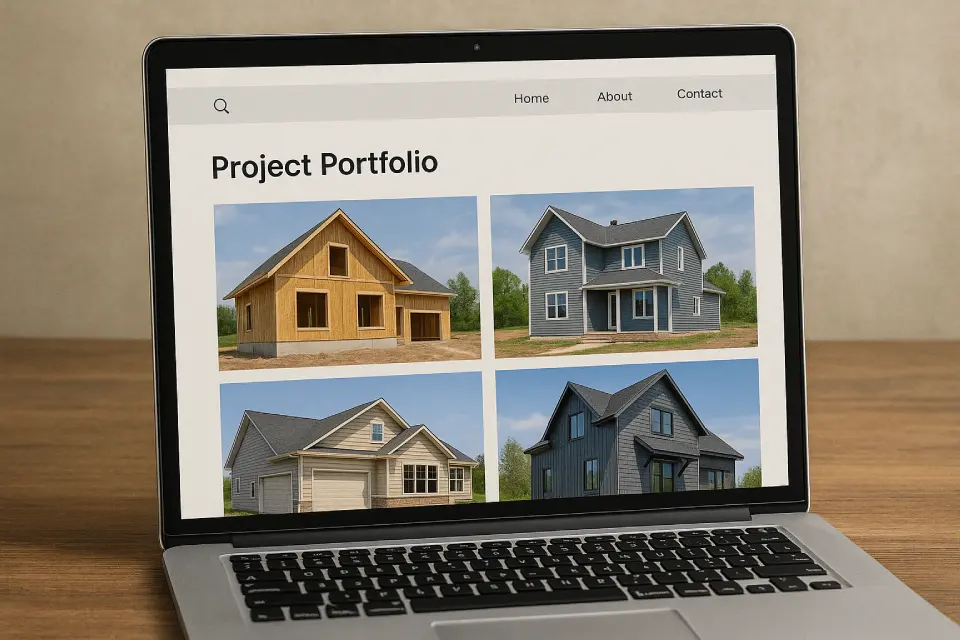15 Steps to an Effective Construction Business Website
In today’s digital world, your website is the face of your construction business and your brand. Whether you’re a general contractor, specialty tradesman, custom builder, or a full-service construction firm, your website is often the first impression potential clients have of your company. Historically, many contractors have been great at providing quality construction services and building impressive structures, but not always so good at the sales and marketing side of their organizations.
We still see that today, as many contractors have no website or they have low-end, cheap, and outdated sites that do little to support their business’s success, and even worse, can reflect poorly on their organizations.

A strong online presence is no longer optional for contractors—it’s essential for attracting clients, showcasing your work, and growing your business. Customers and potential prospects are constantly seeking information about construction services and looking for quality contractors online. Additionally, having an effective website can help streamline client communications and help educate prospects about your processes, service options, and upgrades. To support your business success, your website should both attract and inform new and current clients.
So, where should you start? If you are a construction contractor and in the process of evaluating your current site or planning a website design and development project for your business, here are 13 steps to building an effective website that will support your company's growth, enhance your brand, and improve your visibility to prospective future clients.
01.
Build Credibility
But that is just the beginning. One of the main objectives you should have as you plan for your new website is to ask yourself, “how can we increase the credibility of our business on the new site?” Because if you achieve this goal, you’ll also help to bring in more new clients and projects.
Another way to ask the same question is, “What content or information will showcase us as quality construction contractors in our specialty area?”
Below are a few types of content that will establish your company as an industry leader and help build trust with potential clients.
- Detailed service descriptions
- Client testimonials or Google reviews
- Industry certifications
- Awards and recognition
- Quality photos of your work
- Featured projects showcasing successful work and expertise
A strong credibility story will help convert visitors into clients, demonstrating that you’re a reliable and experienced contractor.
What content or information will showcase us as quality construction contractors in our specialty area?
02.
Make It Mobile-Friendly

A large portion of your audience will access your site on mobile devices while at home or researching on the go. In 2024, mobile devices accounted for approximately 56.75% of all U.S. website traffic.
A responsive design ensures your website looks and functions well on smartphones, tablets, and desktops, providing a seamless user experience regardless of the device.
Tip: A mobile-friendly site also performs better in search rankings (local SEO), helping you get found by potential clients searching for construction services.
In 2024, mobile devices accounted for approximately 56.75% of all U.S. website traffic (source: DigitalSilk)

03.
Focus on Ease of Use
Creating a user-friendly website is essential for effectively showcasing your services and engaging with potential clients.
- Make sure this information is easy to find and navigate.
- Design your site to be user-friendly with a clear menu structure and a search function.
- Having well-organized content helps potential clients quickly understand what you offer.
- Begin by clearly outlining the services you provide with descriptive headings and concise summaries.
- Visual elements like images and videos can enhance this section by demonstrating your skills and past projects.
Showcasing your project portfolio is crucial. Highlight your most impressive projects with detailed descriptions and high-quality images to demonstrate your capabilities. Display your contact details prominently, including a dedicated contact page with a form, phone number, email, and physical address if applicable. This invites visitors to reach out with questions or proposals.

04.
Answer Common Client Questions
The more basic questions you can answer online, the more time your staff will have for important project work. Include details about your services, experience, process, billing, and service area. An FAQ page can save time for both you and your clients by addressing common concerns upfront.

05.
Clearly Communicate Your Services and Specialties
Be explicit about your specialties and expertise, whether it’s kitchen remodeling, excavation, commercial build-outs, or custom home construction. Sometimes a description of a service may be obvious to you, but not to your prospects. So explain services (like environmental construction, rip rap, erosion control, piering, etc.) clearly and give examples. Where possible, include photos or videos to showcase your skills, differentiate your business from competitors, and show prospects what is possible.

06.
Create a Pre-Launch Sitemap and Content Plan
Before launching your site, develop a sitemap and plan for all the pages you’ll include. Start with a sitemap outline, broken down by your main menu items and pages. Then, begin to break down your main construction services with pages for each important service. If you offer a wide variety of services, you may want to break things down further, including sub-sections for commercial and residential services, for example. Make sure to highlight any unique services that set your business apart from your competition.
In the “About” section, consider simple bios to personalize your team, listing contact information, job titles, and photos. Make sure to include a testimonials page to add credibility. Positive client testimonials build trust and can be the deciding factor for a new client choosing your services. Display testimonials prominently on your dedicated reviews page, but also consider including some on the homepage and project pages.
We’d also encourage having a “Where We Work” page so prospects know how far you’ll travel to work on projects. These pages also help your site show up in local Google searches, supporting lead generation.
Encourage satisfied clients to leave reviews on Google, Facebook, or industry-specific platforms, and showcase these on your website. Positive reviews impact search results and web conversions!

07.
Showcase Your Work with a “Featured Project Portfolio”
Simple photo galleries are great, and we recommend them, but potential clients want to see more detailed examples of your work before making a decision. Include high-quality photos of your past projects, but also include project descriptions, highlighting the scope of work, features, challenges faced, types of clients, and results achieved. Before-and-after photos, video tours, and drone shots are also great ways to showcase the quality of your craftsmanship.

Featured Project Pages that include photos, the services you provided on that project, and the project location are great for helping your website to show up in local Google searches. And they add credibility for your company by making visitors feel confident in your capabilities, especially if their upcoming project is similar to work you’ve done before.
According to Google, website users conduct more than 1.7 million online searches for contractors each month (source: Blue Corona)
08.
Provide Your Contractor License Information
Depending on your specialty and the state or states you work in, you may need to display both local and state license information. Avoid burying it within a paragraph where it’s hard to find. Instead, place it in a bold, easy-to-read font in your website footer or on a separate page easily accessible from your menu. Making this information instantly visible reinforces your company’s credibility and professionalism.
You may want to showcase Industry certifications or memberships on the same page with your license information to increase credibility.
09.
Develop an Ongoing Content Marketing Plan
Maintaining an ongoing content marketing plan post-launch is crucial for building credibility and generating leads while keeping your site engaging. Focus on updating areas of your site like the “Photo Gallery” and “Featured Projects.” Add one to two new projects each quarter, showcasing a mix of different project types and locations to enhance your portfolio and improve search visibility.
Consider adding a blog or news section to engage with prospects. Blog once or twice a quarter about current projects, planning tips, remodeling trends, new offerings, or company news. Share these posts on social media to drive extra traffic with minimal effort.

Consider using AI tools to generate blog ideas related to your speciality and to assist with efficient content creation.
10.
Invest in Search Engine Optimization (SEO)
Effective SEO starts with comprehensive keyword research to understand how potential clients search for services in your area. For example, if you're a landscaping contractor, keywords might include terms like "landscaping services near me," "lawn care," "outdoor lighting," and more. It's crucial to prioritize the most relevant and high-volume search terms to create successful content and website strategies.
After identifying priority keywords, execute on-site SEO, which covers site structure, content marketing strategy, and essential practices like title tags, meta descriptions, and blog structure. While not all construction firms may be SEO experts, understanding the basics allows you to evaluate vendor proposals effectively.
Local SEO is especially important for contractors. Optimize for location-specific keywords like "Indianapolis bathroom remodeling" or "Orange County home renovation."
11.
Include Strong Calls to Action (CTAs)
Tip Place CTAs in strategic locations, such as the top of the homepage, at the end of service descriptions, within blog posts, and on featured project pages.

12.
Select a Reliable Marketing Partner With Construction Website Experience
If they have experience with your specialty (landscaping, roofing, etc.) and understand your differentiators, that is even better. Make sure they can support you with additional services after your site is live.

Before selecting a vendor/partner, review sites they’ve built, ask for testimonials, and results they have achieved for contractors like you.
13.
Make Sure Your Website is Easy to Update and Manage
Choose a CMS that is intuitive for non-technical users, flexible, and offers strong customer service. Make sure you have access to support from real people in a timely fashion when you need it. Ask your partner about their flexibility. You might prefer updating your website yourself, or maybe you’d prefer that your partner does it for you. The most important thing is that it gets done.
A quality CMS and website partner should allow you to focus on your construction business without worrying about technology. So, ensure your CMS includes quality support, automatic updates, security, backups, and AI features.
14.
Assign Website Management Responsibilities
Assign a staff member to be accountable for your website, as it is an important asset and the face of your company. Even if that individual isn’t handling the updates themselves, someone on your team should be responsible for making sure you get the most value from your site over time. Keeping your website fresh and functional will enhance its value and ensure long-term success.
Add “website updates” to your monthly or quarterly planning meeting agenda to ensure your site supports new company initiatives.
More than 85% of the population searches for contractors online for local construction services. (TownsquareInteractive).
15.
Measure Your Website’s Performance
Monitor key metrics such as traffic, page views, and conversions. Understanding these insights will help you make data-driven decisions to improve your site and increase leads.
Regularly review your SEO rankings and website traffic sources to refine your digital marketing strategy.

62% of customers will ignore a business without a web presence (source:WebFX)

97% of consumers look for information about local companies online more than anywhere else. (Constant Contact)

68% of online experiences begin with a search engine (OpenAsset)
Conclusion
A well-planned and executed website can be a powerful tool for your construction business, helping you attract clients, showcase your work, and grow your brand. By following these fifteen (15) steps, you can create a professional and effective online presence that sets your business apart.
At Marketpath, we’re not just experts in website marketing; we understand the importance of a strong digital presence. If you’re ready to build or update your construction business website, contact us today to learn how we can help you create a site that drives results and reflects the quality of your work.
👉 Download the full whitepaper or just sign up for your new website right away.